- Home
- J. -H. Rosny aîné
Helgvor of the Blue River Page 11
Helgvor of the Blue River Read online
Page 11
As Heigoun laughed insultingly, Shtra, Iouk, Helgvor and the others silently threw at Akroun’s feet the severed thumbs of the warriors. There were 24!
“It is well,” the chief said. “Shtra is indeed a great warrior.”
“Shtra is not a great warrior,” the old man answered. “It was Helgvor, clever as a lynx, strong as a tiger. He killed more than 12 Tzohs!”
“Shtra lies!” Heigoun yelled.
“Shtra tells the truth!” Iouk said.
And the warriors who had followed Shtra shouted,
“Shtra tells the truth!”
Then many other warriors hailed Helgvor, and Akroun felt his power returning.
“Helgvor is mightier than Heigoun!” a voice said in the crowd.
“Heigoun shall crush Helgvor as the leopard crushes the doe!” roared the son of the Wolf.
“Helgvor does not fear Heigoun,” the young man said. He faced the giant, spear and club ready, but warriors intervened while Akroun spoke.
“The Ougmars have not recaptured all their women! They need both Heigoun and Helgvor!”
“Heed Akroun, the chief!” 20 voices shouted.
The son of the Wolf controlled his anger. “Helgvor shall perish when the women are retaken!”
“Helgvor shall beat down Heigoun!” Then Helgvor, astonished not to see Glava, asked, “Where is the daughter of the Rocks?”
“The foreign woman fled!” the chief explained. “Rain drowned the camp, the fires were dead. It was so black that a herd of mammoths would have passed unseen. Even the dogs knew nothing.”
Speaking thus, Akroun reassured and won to his side those who had watched Glava, for they knew that if Heigoun became chief, they would suffer. As had his rival, Helgvor said,
“She must be caught.”
“The warriors sought her long.”
The gloom which swept Helgvor was so intense that he forgot his recent victory. “Helgvor will go to seek Glava!” he stated.
“Not until the Ougmars have retaken their women!” the chief replied.
A longing to rebel shook the young man, but the Law of the Race won out. “Helgvor shall wait until the women are retaken!”
XVI. Battle Plans
Because the Sun was low, Akroun put off the start until morning. Now, only one path appeared good, for Shtra, Iouk and Helgvor agreed with Heigoun, and all the women advised it.
“Tomorrow we leave for the south-east,” the chief said.
During the night, Helgvor awoke thinking of Glava. He knew she would undertake to find Amhao. If the coming expedition was quickly over, perhaps he would reach the Red Peninsula before her. That hope appeased him for a moment, then the fear of the perils she would run contracted his chest. He saw her being downed by a wild beast, drowning in the river, and infinite desolation seeped into him.
At dawn, Akroun called the older warriors together.
“The women could not follow quickly enough. They must return with a few guards to the Red Peninsula.”
Some of the Ougmars received this advice with regret.
“Won’t the Tzohs come back to capture them again?”
“The Tzohs won’t dare. They’ve lost too many warriors.”
When those who were to escort the women were selected, Helgvor asked Shtra to propose him for the mission. Both Akroun and Heigoun refused.
Beyond the hills of the south-east, the plain spread endlessly, an ocean of grass on which existed the great grass-eaters, mammoths, horses, aurochs, antelopes, deer, galloping under the rough glare of the Sun, under the drifting clouds, through storms and the white ferocity of the winters.
After a few hours’ march the ponds were reached, around which the Tzohs had been found, and all searched for the tracks of the band which had started eastward. By evening a warrior named Akr discovered the ashes of an encampment and the stripped carcass of a stag.
The dogs sniffed about, the men bent low to scan spoors.
“The Tzohs camped here several days ago,” Shtra stated.
A coppery twilight, fused with blues and greens, spread across the western clouds on which the crescent moon etched its slender horns. A warm wind caressed the men’s faces. The chief was uneasy. The tracks by the ponds announced a strong party of Tzohs, and the glance of Akroun wandered often to count the Ougmars and Gwahs.
Because they were kept supplied with roasted meat, a happy confidence reigned. But there was no joy for Helgvor; the world seemed lost, his happiness had gone with the daughter of the Rocks, into the solitude.
“The eyes and ears of Helgvor must be keen,” Shtra whispered. “Heigoun will make traps.”
“The same soil can no longer bear us both!” Helgvor agreed.
“Shtra will fight for his son.”
“Iouk also.”
A brief tenderness shaped in those primitive souls, which mingled with dim shame within the rough instincts. Shtra had watched over the childhood of his companions. Irresolute man, mediocre warrior, he loved his own people, and Akroun, of whom he felt the superiority with a vague pleasure at being dominated. Iouk was much like him, and both, effortlessly, centered their family pride upon Helgvor. Despite his quicker passions, his deeper hates and his fiercer anger, Helgvor shared with them the weakness of being affectionate, and at times even merciful.
“Akroun is also Helgvor’s friend!” Shtra resumed after glancing about cautiously. “He desires the death of Heigoun because Heigoun wants to take command and kill Akroun!”
“We are the chief’s allies!”
A lion appeared upon a hillock, shook his mane and his enormous voice roared a threat to space; wolves, dogs and a panther were seen. Yet the men dominated the land; even the mammoth and the rhinoceros retreated before man, who ruled the Earth.
At times the glance of Helgvor turned toward the northern section of the camp where Heigoun and his followers rested.
Night followed day, and day followed night many times.
The men marched to their destiny. The plain was broken by clumps of trees, and sometimes by thick forests which warned of the proximity of the south-eastern jungle.
Had it not been for the ashes of fires, the tracks might have been lost. But the Tzohs lit fires each night. It had been ascertained from these that the troop numbered 60 warriors and a score of women.
Their march had been much slower than the progress of the Ougmars, and the time came when but a half-day’s march separated the two hordes. To cut down that distance even more, the Ougmars marched several hours by the light of the Moon, which had become full.
Akroun then gathered the veteran warriors.
“Tomorrow the Ougmars fight!” he said.
And all understood that the battle would be bitterly waged.
“The Ougmars must surprise the Tzohs!” the chief added.
“During the march or in camp?” asked the oldest fighter.
“At twilight,” Shtra advised. “Thus did Helgvor vanquish.”
“If they must be surprised on the march,” Akroun wondered, “must we not head them off?”
“Heigoun will surprise them!” the giant declared.
“Heigoun is powerfu1 as the aurochs! But the aurochs is not as speedy as the stag or the wolf! Now, Helgvor is swift…”
Akroun allowed his words to sink in. “What Helgvor did was well done. The fleetest shall precede us, and because it will take one day to reach the Tzohs, it shall be toward night that we attack them. We shall have the light that lingers after the Sun has sunk into the lakes, and then the full light of the Moon. Therefore, Helgvor and the most agile Ougmars shall lure the Tzohs out of their camp, and we will surprise them. Heigoun will smash them up with his club.”
The giant did not like the plan, but the others approved.
“Which of the warriors shall go with Helgvor?”
There were Akr, Houam and Pzahm, all three in their youth. Akr was the fleetest, Pzahm the slowest.
“Pzahm will fight with the clan,” Helgvor decided. “There
is no need of more than three men. Before daylight we shall leave, with my wolf and my dog; they know how to keep silent.”
“So be it!” Akroun concluded.
But Heigoun turned a murderous stare upon the young man.
Helgvor rose an hour before dawn. The Moon was huge on the western sky, the hue of molten copper. Akr and Houam were ready, both thin, with weak arms and long legs. Akr had raced against Helgvor in the past. For many seasons their speeds had been equal, first one then the other won out. Then Helgvor had won all the time. It was not likely that among the short-legged Tzohs there would be any who could catch Akr, but Houam was not as fast, not as trustworthy.
XVII. Battle of the Clans
First, Helgvor and his two fellow scouts had to ascertain the strength of the enemy and report to the chief. Only toward evening, Akroun having prepared the ambush, should Helgvor lure the Tzohs to their doom.
The Tzohs had changed their route since the preceding night, striking westward, probably in the hope of finding the river again. On the terrain covered in the last few days, the flood had caused no damage. It was seldom that the ravines had been found flooded.
Helgvor, with his wolf and his dog, followed the trail as easily as if the foe had been in sight. The tracks were so clear that they had to proceed with care. Luckily, there were few thickets, and the grass was rather short.
At noon they came to a range of hills rising from the plain. As they climbed the slopes, Helgvor and Akr found many traces, and when they reached the crest, the scouts saw the enemy’s band and the women. The sight of the women and the girls maddened Houam for the Men of the Rocks had taken away his mate and his young sisters. Hatred stirred Akr, although his wife was among those who had already been rescued by Helgvor. Because he had lived through a like adventure before, Helgvor remained calm, although his heart beat harder.
“We must go downhill by the ravine,” he suggested, “then by the pools.” Casting a glance at the sky to ascertain the time, Helgvor added, “Will Houam go back to our people and warn them?”
As agreed, the scouts had left clear traces of their march, and Akroun could have had no trouble following them.
“Houam will warn the warriors.”
While Houam went back to the north-west, Helgvor and Akr passed through the ravine and circled the pools. Skilled at hiding themselves, nothing betrayed them. And the Tzohs walked without fear, confident because of their numbers. They marched slowly. The flood had reached this section and made the trip difficult. Many were obviously tired, not a few wounded. Moreover, the women had to be spared too great fatigue.
Through the grass, behind hillocks, bushes and trees, Helgvor and Akr followed the hostile horde. The Tzohs halted before the Sun grew red with approaching twilight. They had chosen a formidable position in which to camp. Protected by pools and boulders, it could be reached only through a gap in the rocks, easily fortified, easily defended. Pines and firs supplied wood for the fires.
“The Tzohs are mighty!” Akr said, doubtfully.
“The Ougmars shall not attack their camp!” Helgvor replied. He laughed low, and resumed, “They would be dangerous to attack with club and spear, with hatchets. Dangerous also against spears. For one would have to risk their weapons in return. But, with his bow, Helgvor can harm them without coming within their range.”
He indicated his bow, and Akr, knowing his reputation, grinned. The Tzohs were still gathering wood, and a few came toward the bush behind which the two Ougmars had taken shelter. Although it was improbable that they would come this far, Helgvor and Akr retreated to the tall grass. The dog and the wolf, now accustomed to hunting man, imitated them without need of speech.
The Sun was setting in an enormous blaze of red against the west when Houam returned.
“The Ougmars are in the ravine,” he said.
He related that Akroun had chosen a spot pitted with caves. But Helgvor went back to the main body. He addressed the chief.
“This place is too far to lure the Tzohs.”
“Let Helgvor guide us.”
And the son of Shtra led the Ougmars into a thicket within 1000 cubits of the Tzohs’ camp. The Sun had vanished and light was dwindling on the plain.
“We must wait for moonlight,” the chief said. “What does Helgvor wish now?”
“Another bow and many arrows.”
Behind the fires of the Tzohs, glowing brighter as the twilight darkened, the swarthy faces of the warriors could be seen clearly. The women also could be discerned, and many of them appeared resigned to their lot.
Helgvor selected a second bow, that of a warrior with mighty arms, a weapon which few men could use well. Arrows were brought. Helgvor tested the bow, adjusted its tension. Then, patient as animals in ambush, the warriors waited in the shadow. The sky was overcast, and they saw neither the great blue star, the Northern Cross, nor the red star. Many closed their eyes and drifted into a light sleep. Then the Moon appeared at the edge of the plain, dipped its distorted disk into pools, while millions of frogs croaked like old men.
“The son of Shtra must prepare to go,’’ Akroun said.
The orb, at first much like a red cloud, condensed and became like the polished blade of a hatchet, its light turned the plain into a limitless, silvery lake.
Already, followed by Akr, Helgvor crawled through the grass. When they had gone 500 paces, Akr hid, and permitted the son of Shtra to go on alone. The Tzohs were dropping off to sleep. A few sentries squatted near the entrance. Before so many warriors skilled in the use of hatchet and all weapons, what could be done by a lion, a tiger, or a gray bear? Spears alone would have riddled them. The Tzohs felt secure.
Suddenly, the only presence they would fear manifested itself. A tall man was standing in the grass!
At the first alarm, Kzahm, son of the Boar, stood. The warriors, startled from sleep, were puzzled and bellowed questions. And the resounding voice of Helgvor defied them.
“The Ougmars come to punish the skunks!”
Clubs whirled, spears were darted. Helgvor, with a savage laugh, took his bow and aimed. The arrow pierced the neck of a Tzoh. The outcry died out and deep surprise immobilized the Men of the Rocks; no Tzoh bow could have sent an arrow that distance. Advancing a few steps, Helgvor shot again; the arrow stabbed between the ribs of another man.
Upon an order from Kzahm, the warriors fell headlong to the ground. The third arrow missed, the fourth dug into a shoulder. Thus, Helgvor made the camp unsafe.
Seeing but a single warrior, Kzahm grew ashamed and ordered a pursuit. Not too trustful, nevertheless, he dispatched only 15 warriors against that odd adversary. Feeling that delay was dangerous, the warriors rushed headlong. Helgvor waited for them to come halfway, his bow hummed three times. The first arrow pierced a belly, the second knocked out an eye, the third missed. Several of the Tzohs returned his shots, and an arrow scratched his thigh, but the Ougmar ran, and increased the distance separating him from his pursuers.
The appearance of Akr worried the Tzohs and slowed them a while. He fired an arrow, missed, and pretended to flee, while Helgvor stood still. Five men headed for Akr, eight sought to surround Helgvor, who avoided them with ease.
Scattered in a semi-circle, fierce and desperate, for the fugitive’s speed left them small hope, they kept on stubbornly. Then Helgvor raced to the right and, with a blow of his club, killed an isolated warrior. Then his arrows hummed again, and he faced the remaining five.
“The Tzohs are not even hyenas!” he derided them. “The Tzohs can’t fight anyone but old men and women!”
Some distance away, Akr had reached the ambush. Twenty Ougmars leaped out, terrifying the Tzohs who were killed off almost without offering resistance, while Helgvor dropped two more of his foes.
Now, Kzahm was aware that the night of life or death had come. The Ougmars, the Gwahs and the dogs howled all together. Because they had appeared suddenly where they were not expected, they seemed the more formidable. Memories were stirred in t
he skulls of the veterans, the legends woven around the Ougmars. But the battle must be fought: the Ougmars were coming. Around them were scattered the fierce dogs and the Gwahs with pointed ears.
Furious puzzlement quivered in the Black Boar’s breast. He thought of rushing out to meet his enemies, but the numbers of the Tzohs and those of the Ougmars were now almost equal, and moreover there were those black men, those dogs with the terrifying bark. From the elders, Kzahm had heard of the Men of the River, knew their strength to be great, their agility extreme. He alone, he thought, was more formidable than any Ougmar. He decided to wait for the attack and had fresh branches piled across the gateway. The warriors could take shelter behind the heap of wood and bush.
But Akroun called a halt to inspect the Tzohs’ camp. He saw that the storming would be hard to push through, and would cost many lives.
“It is wood that fire loves to eat,” Helgvor said, coming near.
“Helgvor is as sly as he is valiant,” Akroun smiled.
He ordered that dry branches and twigs be gathered, then, torches in hand, the Ougmars went forward once more. Close to the camp, they tossed the flaming bundles into the barrier. Smoke lifted.
Kzahm had guessed his foes’ plan quickly. To avoid the spread of flames over the entire camp he ordered the barrier fired, and the two blazes clashed. On both sides, men waited until nothing but ashes remained. As the Ougmars had to cross a narrow spot or wade in the pools, Kzahm decided to stand his ground and wait for them.
“The Men of the Blue River seek to die!” he clamored to cheer his followers. “They shall die!”
The Ougmars replied with their war-cry, but still Akroun delayed an onrush. He preferred to order his best bowmen, Helgvor principally, to harass the enemy with arrows. This tactic could not fail. When several Tzohs had dropped, Kzahm realized that his wait meant disaster, and ordered an offensive movement.
It was like a mass of bodies, of hatchets, stakes, clubs and spears. Fearing panic, Akroun opposed onslaught with onslaught. The mass of the Ougmars dashed forward, while the Gwahs hovered on the flanks, pelting the Tzohs with sharp stones.

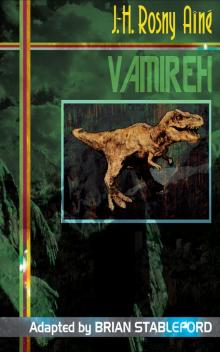 Vamireh
Vamireh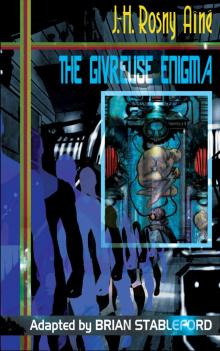 The Givreuse Enigma
The Givreuse Enigma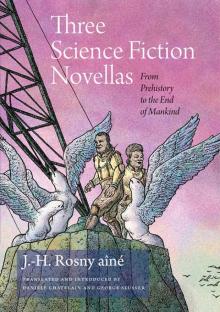 Three Science Fiction Novellas: From Prehistory to the End of Mankind
Three Science Fiction Novellas: From Prehistory to the End of Mankind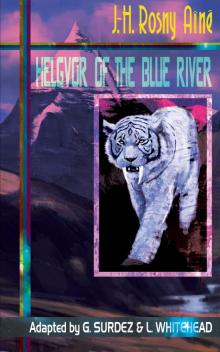 Helgvor of the Blue River
Helgvor of the Blue River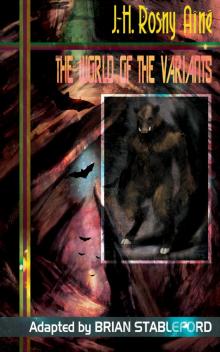 The World of the Variants
The World of the Variants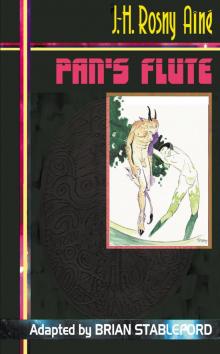 Pan's Flute
Pan's Flute The Navigators of Space
The Navigators of Space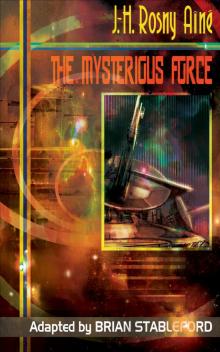 The Mysterious Force
The Mysterious Force